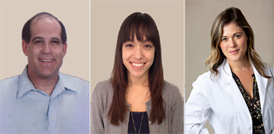ROSACEA: ADULT ACNE. Q & A
For adults, getting acne can be a very difficult problem. Often, this happens to patients who never had acne during their teen years. The problem can be an embarrassment and a personal handicap especially in social or business situations. There is help.
What is rosacea?
Rosacea, pronounced
"rose-ay-sha", is a dermatologic disease that causes redness,
pustules, papules, and inflammation of the facial skin. Rosacea is commonly,
but mistakenly attributed to alcohol consumption or may be referred to as
"adult acne” as it is related to acne.
How do I recognize rosacea?
Rosacea usually begins as a
persistent sunburn like facial redness and flushing. As rosacea progresses,
pimples appear on the face in the form small, solid red bumps (papules) and
pus-filled bumps (pustules). Pustules and papules may be accompanied by a
condition called telangiectasia- thin, red lines caused by dilated blood
vessels on the surface of the skin. Unlike acne, there are no blackheads or
whiteheads, and this disease affects primarily the central portion of the face,
particularly the center of the forehead, the chin and the lower half of the
nose. In more advanced cases of rosacea, and more often in men, a condition
called rhinophyma ("ryno-fi-ma") develops. A bulbous, enlarged red
nose and puffy cheeks characterize Rhinophyma. Comedian W. C. Fields had a good
example of this condition if you recall his nose. In addition to skin
involvement, rosacea may also affect the mucous membranes of the eyes. Patients
may complain of eye soreness or grittiness, a sign of ocular inflammation,
commonly known as conjunctivitis. Untreated ocular rosacea may lead to a more
serious complication called "rosacea keratitis," which may threaten
vision. If these symptoms are not relieved, see an ophthalmologist.
Who is affected?
Fair skinned women ages 30
to 50 are most susceptible to rosacea. Men are affected almost as frequently.
Most patients tend to be of northwest European descent, especially Celtic.
Other risk factors include a family history of rosacea and "sensitive
skin." Teenagers who are unusually sensitive to basic drug store cosmetic
products and acne medication are potential candidates for rosacea in later
years. One should keep in mind that rosacea may develop in the absence of any
known predisposing factors. Rosacea may also be aggravated by long-term use of
potent topical steroids or use of fluoride containing toothpastes.
What are the aggravating factors?
The exact cause of rosacea
is still unknown, although studies have shown that many factors can irritate
the condition. As a general rule, anything that increases facial redness will
tend to worsen rosacea. Alcohol consumption of any type, spicy foods, hot
drinks (including tea and coffee), and smoking will all complicate the problem
by causing blood to rush to the affected areas, and aggravate flushing. It's
important to note that, although alcohol may worsen a case of rosacea, symptoms
may be just as severe in someone who does not drink at all. Certain drugs like
nitroglycerin, theophylline, and niacin may dilate cutaneous blood vessels,
cause flushing, and may aggravate rosacea.
How is rosacea treated?
Rosacea can be treated,
however, there is no cure. Thus, preventative factors play a role. Stress,
alcohol, fatty foods, cheeses, nuts, hot temperature foods, and hot, spicy
foods, may flare rosacea. Since the majority of those affected by rosacea are
unfamiliar with it, identifying the disease is the first step in treating it.
When left untreated, rosacea may worsen and may become difficult to control.
Self-diagnosis and treatment are not recommended as some over-the-counter skin
applications may magnify the problem. Total therapy usually combines a sensible
diet, avoidance of known aggravating factors, and appropriate medications. Your
doctor may initially prescribe topical and/or oral medications. Once you
respond, if you have been on oral antibiotics, the doctor may discontinue the
oral medication and may continue your topical medication. If you are requiring the
oral medication more often, come back to the office so your topical medications
can be changed. Long-term use of oral antibiotics is not as safe as taking them
as needed and relying on a topical program. If you have rosacea, Dr. Jacobs
recommends that you cleanse your skin with Aquanil gentle cleanser and cool
water. Do not use hot water. Rosacea therapy requires daily care. If you are
diligent and care for your rosacea on a day-by-day basis, your treatment
programs can alter the progress of rosacea and can prevent late stage
complications such as rhinophyma and scarring.
What are the medications?
Topical (surface)
antibacterial agents may be prescribed by your doctor. These include topical
Metrogel, tetracycline, clindamycin, erythromycin, and Plexion, alone or in
combination with a mild topical steroid to decrease redness (hydrocortisone).
Oral antibiotics may be useful in the treatment of rosacea. Tetracycline
derivatives, minocycline, and doxycycline are most commonly used. Erythromycin
can also be used. Avoid tanning and excess sun with these.
What about advanced therapy?
Surgical treatment of
rhinophyma (enlarged nose) may be accomplished by dermabrasion, scalpel
surgery, electrosurgery, or laser surgery. Telangiectasias (small dilated blood
vessels) may be treated with a small electric needle, laser, or surgical
ligation. Accutane (a potent vitamin A medicine taken by mouth) may be used in
resistant cases of rosacea, and works very well. Please be informed that
Accutane is not FDA approved for the treatment of rosacea. Accutane is approved
for acne and can also work for resistant cases of rosacea.
|
 |
|
|
 |
 |
|||||||||||
 |
|||||||||||||
 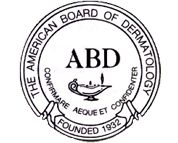 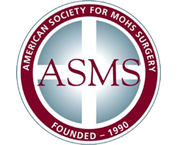 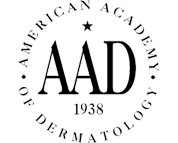 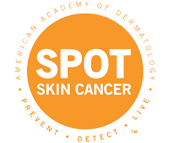
Home | Dry/Sensitive Skin | Skin Renewal | Skin Complexion & Acne | Dermatology Patient Education |


